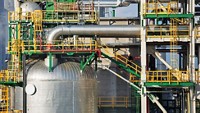Advertisement
Grab your lab coat. Let's get started
Welcome!
Welcome!
Create an account below to get 6 C&EN articles per month, receive newsletters and more - all free.
It seems this is your first time logging in online. Please enter the following information to continue.
As an ACS member you automatically get access to this site. All we need is few more details to create your reading experience.
Not you? Sign in with a different account.
Not you? Sign in with a different account.
ERROR 1
ERROR 1
ERROR 2
ERROR 2
ERROR 2
ERROR 2
ERROR 2
Password and Confirm password must match.
If you have an ACS member number, please enter it here so we can link this account to your membership. (optional)
ERROR 2
ACS values your privacy. By submitting your information, you are gaining access to C&EN and subscribing to our weekly newsletter. We use the information you provide to make your reading experience better, and we will never sell your data to third party members.
Petrochemicals
Ineos makes major China push through deals with Sinopec
The firm buys into Sinopec’s former joint venture with BP, forms pacts in polyethylene and styrenics
by Alexander H. Tullo
July 29, 2022

Completing its reassembly of the old BP chemical business, Ineos has agreed to buy a 50% interest in Shanghai SECCO Petrochemical from the Chinese chemical giant Sinopec. Additionally, as part of this major push into China, Ineos will partner with Sinopec on future projects in acrylonitrile-butadiene-styrene (ABS) and high-density polyethylene (HDPE).
Altogether, Ineos says, the deals are worth $7 billion and will ultimately generate $10 billion in annual sales.
Sinopec built the SECCO plant with BP in 2005 at a cost of $2.7 billion. The complex, in Shanghai, features an ethylene cracker and makes derivatives such as polyethylene, polypropylene, styrene, polystyrene, and acrylonitrile. SECCO had sales of $4.6 billion and net income of nearly $450 million in 2021.
When Ineos bought BP’s polyolefins business for $9 billion, also in 2005, BP left its interest in SECCO out of the deal. Sinopec bought the BP stake for $1.7 billion in 2017.
Ineos then bought the other major leg of BP’s petrochemical business, its aromatic and acetyl operations, in 2021 for $5 billion. The purchase included sites in Chongqing, Nanjing, and Zhuhai, China.
As part of the deal with Sinopec, Ineos is also forming an ABS joint venture. The partnership will include a plant that Ineos’ Styrolution unit is already building in Ningbo, China. The firms plan to build two additional plants, one in Tianjin and the other in a yet-to-be-decided location.
Ineos bought two polystyrene plants from TotalEnergies, in Ningbo and Foshan, China in 2019. “The collaboration with Sinopec allows us to continue to grow in China in fast-forward mode,” Steve Harrington, CEO of Ineos Styrolution, says in a statement.
Also in Tianjin, Ineos and Sinopec will build an HDPE plant that will be completed by the end of 2023. They hope, after that, to build two additional plants that will focus on grades of HDPE used in pipe.
Steve Lewandowski, vice president of olefins at the consulting firm Chemical Market Analytics, says Ineos’ deals with Sinopec create an opportunity to establish a footprint in the fast-moving country.
“It all makes sense,” he says. Some 80% of the world’s ABS production is in Asia because regional demand for the polymer to make finished goods is so strong. The appetite for new polyethylene plants is also hardy as China still imports 20-25 million metric tons per year of ethylene-containing products, mostly polyethylene.
Lewandowski doesn’t think this deal will take Ineos’ focus from the projects it has in other regions. For example, the firm is building an ethylene cracker in Belgium, the only such project in Western Europe. “I think they’re big enough where they can handle everything,” he says.
However, Lewandowski warns that if Europe continues to see extremely high energy costs, owing largely to its dependence on Russian natural gas, the prognosis for petrochemical investment in the region could weaken.




Join the conversation
Contact the reporter
Submit a Letter to the Editor for publication
Engage with us on Twitter